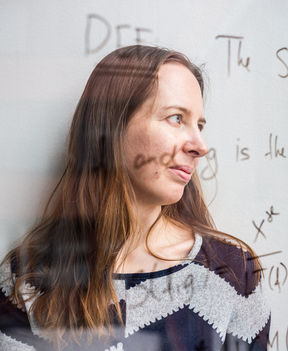Everyday choices: Kaie Kubjas, why does mathematics feel safe?

You study the applications of algebra and mathematics in, for example, biology and computer science. How did you end up becoming a mathematician?
During my childhood in Estonia, mathematics teachers played a significant role in my future career. In the sixth grade, my teacher asked me to take part in a maths competition, and I won. I participated in competitions for a total of seven years and they were a big part of my life, so it was natural for me to go on to study mathematics.
As a young person, as well as mathematics, I participated in physics, chemistry, and even horse-riding competitions. I loved competing!
You have been a researcher all around the world. What is the most interesting thing about your current research?
Problem-solving in general interests me. I wanted to do a PhD to see if I can crack unsolved problems in maths. In research, it is most interesting to be able to combine different fields. For example, I can apply the methods of one field of mathematics to another. At best, I can even find surprising connections and patterns.
In my latest study, we are looking at the 3D organisation of the human genome. Our methods include algebra, geometry and optimisation. The question we’re trying to answer is ‘does the data we already have about the human genome give us enough information to identify its 3D structure.’ We are trying to use optimisation to develop algorithms to determine the structure.
The research project began when I was a researcher at MIT in Boston, and this is one of the first times algebra has been utilised in genome research.
In another ongoing research project, we use applied algebra and geometry in neuroscience. The University of Tartu is one of the project partners and I am already acquainted with two researchers from there. One of them is a friend from my student days. It is easier to start cooperating on applied and uncertain projects when you know the other people in advance.
You apply mathematics extensively. Do you think maths can be trusted?
Logical thinking is important in mathematics and for me personally as well. In general, I trust maths because results are proved using logical reasoning based on axioms, and previous results.
Research articles are peer-reviewed, but some studies with mistakes have also been published. It may be that something goes unnoticed. So, you have to be careful if you use someone else’s results in your own research.
I like conclusions obtained using logical reasoning. Results with proofs feel safer to me than observations from experiments. I see things the same way in my personal life.
You are the Deputy Convenor of the European Women in Mathematics association. The association promotes the networking of female mathematicians. How could we encourage girls and young women to study maths?
We can encourage mathematically gifted young people to participate in various events such as student conferences, courses, and competitions. If they do not have a correct assessment of their own skills, they may not participate in them.
After all, mathematics is interesting and multidisciplinary – I believe that popular science lectures in schools and universities can help to bring out fascinating aspects of mathematics, and science in general. And there are many different areas of application. Even if maths lessons at school didn’t seem interesting, lectures can be. Sometimes a student might not be on the same wavelength as one teacher but they can sync with another.
It is important to set the same high expectations for everyone. In that way, we don’t discriminate and assume that someone is good or bad at mathematics only based on their gender.
Text: Tiina Aulanko-Jokirinne
Photo: Veera Konsti
This article is published in the Aalto University Magazine issue 28, May 2021 (facsimile copy on issuu.com).
Read more news

Apply Now: Unite! Visiting Professorships at TU Graz
TU Graz, Austria, invites experienced postdoctoral researchers to apply for two fully funded visiting professorships. The deadline for expressions of interest is 20 February 2026, and the positions will begin on 1 October 2026.
Hanaholmen’s 50th anniversary exhibition lives on online – making the history of Finnish–Swedish cooperation accessible worldwide
MeMo Institute at Aalto University has produced a virtual 3D version of the anniversary exhibition of Hanaholmen.Soil Laboratory Exhibition – Exploring the Dialogue Between Human and the Earth in Utsjoki
Soil Laboratory explores the relationship between humans and the earth as a living landscape through ceramic practices in Utsjoki.






